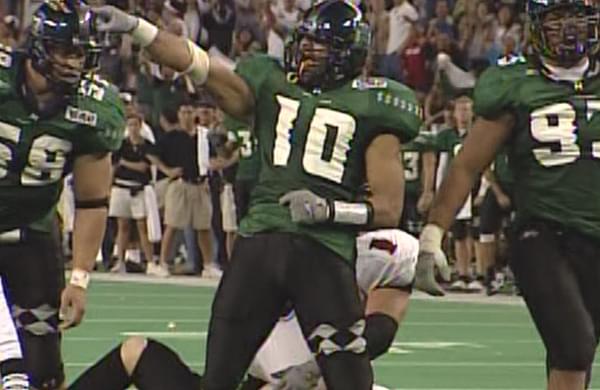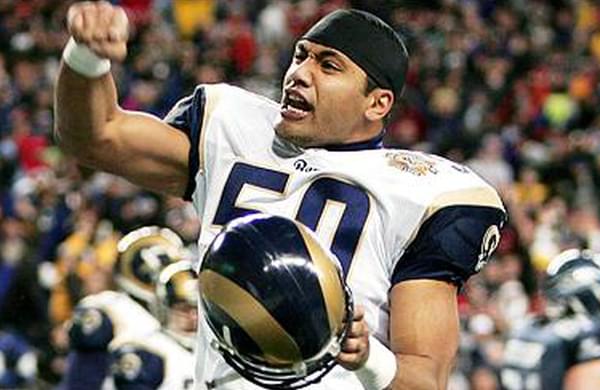Coming out of high school, Pisa Tinoisamoa seemed destined for greatness. After all, how many other football players were named first-team all-conference four times in three seasons?
Coming out of high school, Pisa Tinoisamoa seemed destined for failure. Although regarded as one of the top prep players in the country, only one school offered him a scholarship. A 270-day jail sentence after being found guilty of two counts of felony assault can do that.
Ultimately, Tinoisamoa’s story is one of triumph and redemption. The former University of Hawaii standout is back in the Islands this week, representing his former NFL team, the Los Angeles Rams, in a series of free community events.
Tinoisamoa was born on July 15, 1981 in Oceanside, California. He balled out for Vista High, a school just north of San Diego, leading the Panthers to three consecutive California Interscholastic Federation (CIF) titles. He made First-Team All-CIF as a linebacker in his sophomore and junior seasons. Then, as a senior, he made history by being selected First-Team All-CIF on both offense (as a running back) and defense. He was also named the county’s Defensive Player of the Year and received All-American honors.
By the end of 1999, the North County Times chose Tinoisamoa as the county’s “Player of the Decade.”
It wasn’t all smooth sailing. Tinoisamoa was also in a gang, and his arrest for assault stemmed from a fight in which he tried to help his brother, Mike.
All the schools that had been recruiting him – including the likes of UCLA, USC and Colorado – couldn’t backpedal fast enough. Only Hawaii and the program’s newly hired head coach, June Jones, stood by the troubled prospect. Tinoisamoa signed a national letter of intent to be a Rainbow Warrior, joining a class that included Vince Manuwai, Lance Samuseva, Channon Harris and Justin Tolbert.
Seventy-two percent of the respondents to a Honolulu Star-Bulletin reader poll slammed Jones for signing Tinoisamoa to a National Letter of Intent. But Jones, a firm believer in second chances, brushed aside the criticism.
“I guarantee that most of the 72 percent who didn’t think we should have recruited Pisa would want me to give their sons a second chance,” Jones told the Star-Bulletin’s Paul Arnett in May of 1999. “We believe in this kid. We know the risks involved, but we want to help turn his life around.”
Then-UH assistant coach Dennis McKnight attended Tinoisamoa’s sentencing hearing.
“June knew that this kid’s heart was pure,” McKnight said. “He told me to be at the trial, and when the judge asks if anyone has something to say, you tell him you have a scholarship in hand. ‘Tell him that we believe in this young man and that if we can get him out of San Diego, everyone will see what kind of person he is. Let us give him a chance.’”
Later on, sitting in his jail cell, Tinoisamoa wasn’t as optimistic. “I felt like I really did blow it,” he told a reporter.
Another challenge awaited him when he arrived in Honolulu. He was declared academically ineligible after the NCAA ruled that one of his high school classes did not qualify as a core subject. The next season, Tinoisamoa showed up for camp overweight.
“He wasn’t focused, and his work ethic wasn’t there,” Jones told the Star-Bulletin. “I told him, ‘If you don’t get focused after we’ve given you this chance, I’m done with you.’ Pisa took it and took it to another level, [and] played as well as anybody in the country that year.”
Rainbow Warrior fans know the rest. From 2000 through 2002, Tinoisamoa was about as good a linebacker as anyone who ever wore a Rainbow Warrior uniform. He led the UH defense in sacks all three seasons and set the single-season record for unassisted tackles, with 89. He was named to Second-Team All-WAC in 2001 and First-Team in 2002. That junior season, he received the Alec Waterhouse Award (given to the team’s Most Valuable Player) after posting 129 total tackles, 6.5 sacks, 18 tackles for loss, 8 QB pressures, 2 interceptions, 1 forced fumble, a fumble recovery and a blocked kick.

As the team’s leading tackler, Pisa Tinoisamoa earned All-WAC honors in 2001 and 2002.
In 2009, Tinoisamoa was named to the Star-Bulletin’s “All-Century Team,” a list compiling the Top 100 UH football players in history. Tinoisamoa checked in at No. 27.
Tinoisamoa skipped his final year of eligibility at UH to enter the 2003 NFL Draft. He was selected by the then-Saint Louis Rams in the second round. Led by fourth-year head coach Mike Martz, the Rams signed Tinoisamoa to a four-year, $2.9-million contract.
Wearing No. 50, Tinoisamoa quickly rewarded the Rams with a stellar rookie campaign. He played in all 16 games and finished the season with 76 tackles, 2 sacks and 3 picks. He became the first Rams rookie to lead the team in tackles.
He led the Rams in tackles again in 2004 and 2005. In October of 2006, he signed a five-year, $24.7-million contract extension with the team.
For Tinoisamoa, much of his professional success was inspired by a fellow linebacker standout from San Diego: the late Pro Football Hall of Fame legend, Junior Seau.
“Junior was about 12 years older than me,” he told a reporter. “I was too young to go to his games in high school, but with him going out to USC and then staying in San Diego and playing for the Chargers, watching him made [fulfilling his NFL dream] more realistic. A lot of guys have aspirations of making it to the highest level. Seeing Junior really solidified it for me that it could be done. It became more tangible.
“You think that no one from Oceanside can make it to the NFL. And then Junior does it. It was, like, ‘Oh, man, this can be done.’ I’m not the biggest guy, but I have a huge heart and that’s something you can’t measure.”
Injuries curtailed much of Tinoisamoa’s next three seasons, and the Rams unexpectedly released him in the summer of 2009.
“That’s life,” Tinoisamoa said at the time. “I’ve been through adversity before. I was told I couldn’t play. I was told I was too small. I’ve been abandoned, locked up and hurt. Faith is what carries me. Prayer allows me to fight another day.”
Tinoisamoa played two more seasons, both with the Chicago Bears, before calling it a career.
Once a Warrior, always a Warrior. You know Tinoisamoa is happy to be back in the Islands.
“I love this place,” he recently told KHON2. “Hawaii has a very special place in my heart, and to come back and be able to share the game I love, and to give back to the game I love, easy money! The message I really want to share is: You got to work for what you want. You got to make good choices. It’s nice to be a good football player and all that, but it’s even better to be a great human being.”
— Lance Tominaga, ESPN Honolulu
# # #


